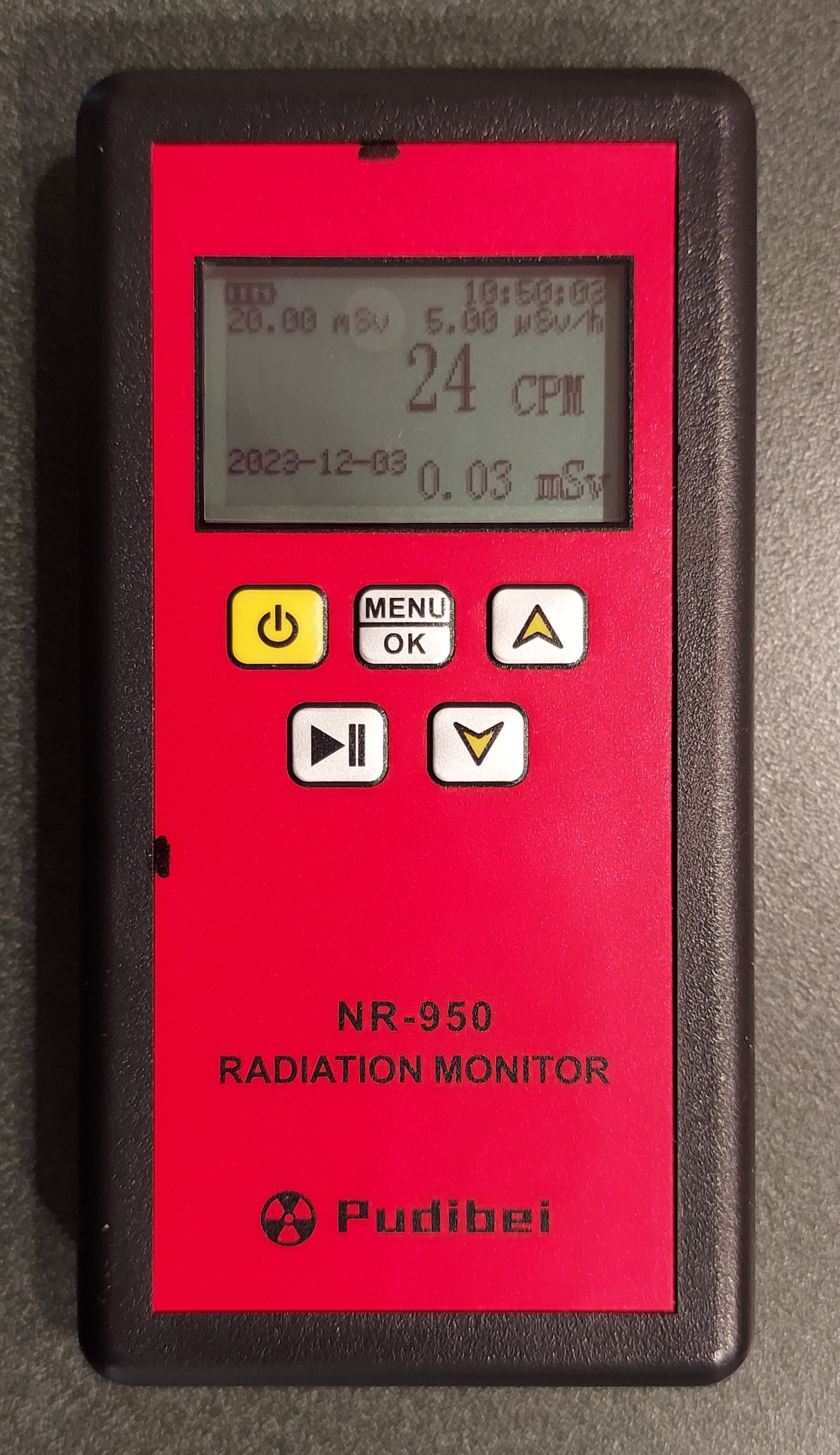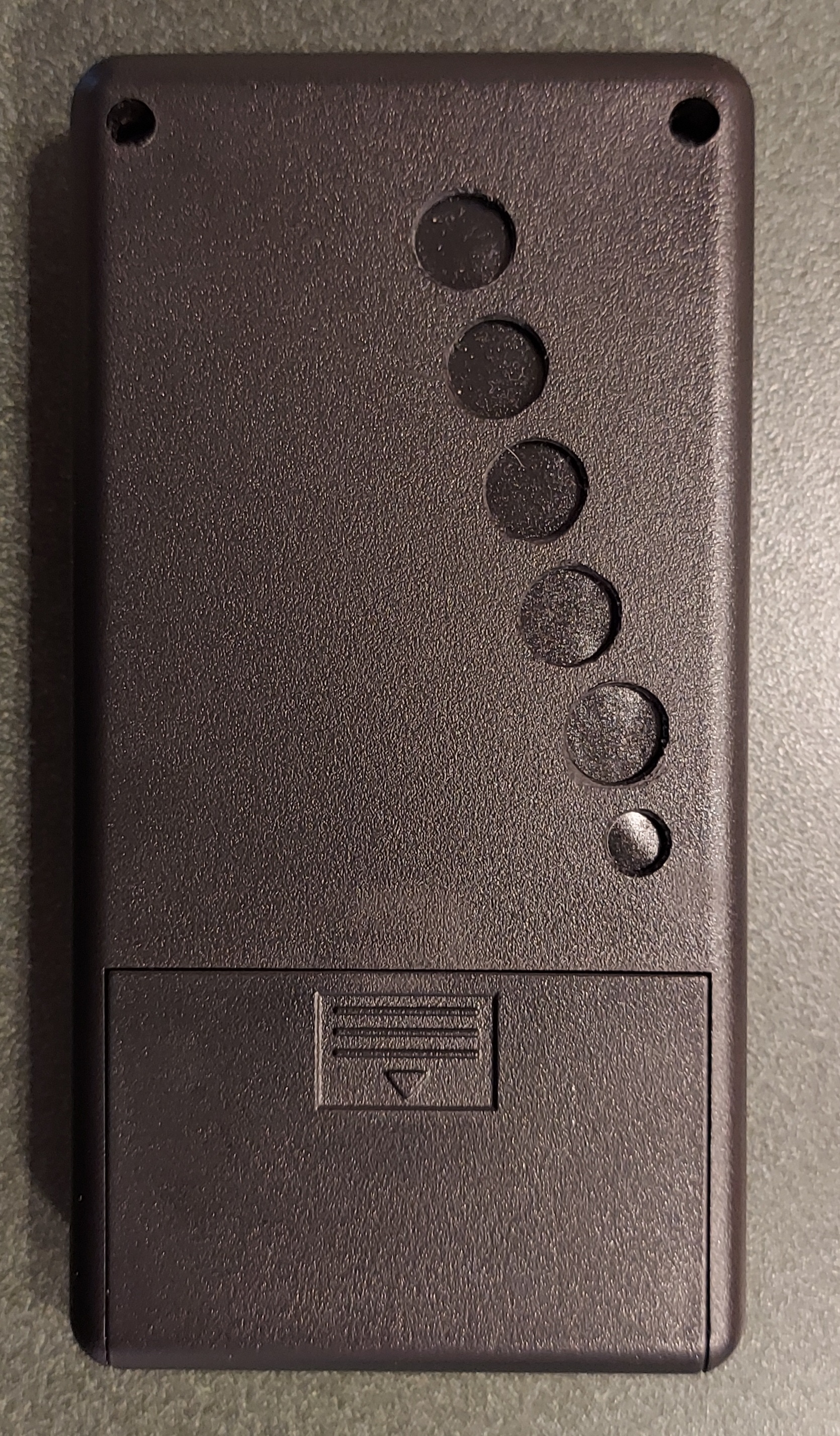| Author |
 Topic Topic  |
|
|
ReadingGuy

USA
4 Posts |
 Posted - 12/14/2023 : 05:48:37 Posted - 12/14/2023 : 05:48:37


|
| I recently purchased the GQ GMC-800 Geiger Counter and have a couple questions. First, the instructions make no mention of where exactly to position the sample you want to test. I experimented with a Geiger Counter Test Card purchased from United Nuclear and determined that the maximum CPM reading resulted when positioning the sample an inch or two below the center rear area of the GMC-800. In this position, the test card produced CPM readings typically around 100 CPM with occasional momentary spikes to the 200-250 CPM range. United Nuclear states that the test card should register in the 500-2000 CPM range. I then measured the same United Nuclear Test Card using a recently calibrated Ludlum 44-7 Geiger Probe connected to a Ludlum Model 3 Survey Meter and achieved consistent readings around 2000 CPM. Is this 10x sensitivity difference between the GMC-800 and a Ludlum probe/meter expected, or do I have a faulty GMC-800. Thank you! |
|
| Reply #1
ReadingGuy

USA
4 Posts |
 Posted - 12/14/2023 : 07:05:25 Posted - 12/14/2023 : 07:05:25


|
| I have seen on other posts that the sensitivity difference I talk about above is attributed by some to the fact that the Ludlum Geiger Counter will measure alpha radiation also, while the GMC-800 will not. However, I believe that the United Nuclear website suggests that their test card emits only beta/gamma radiation. |
 |
|
| Reply #2
UnstableIsotope
   
USA
67 Posts |
 Posted - 12/14/2023 : 07:18:43 Posted - 12/14/2023 : 07:18:43


|
As you note, the Ludlum is sensitive to alpha radiation. No glass GM tube can sense alpha so there's a huge count difference as your test sample is likely emitting mostly alpha and beta. I could be wrong but I'm betting the gamma component is a minority of the output.
The Ludlum with it's windowed detector will also pickup beta better than any glass tube especially when the tube is behind thick unvented plastic. You can't expect any inexpensive glass tube detector to come close to the sensitivity of a windowed survey detector like that Ludlum. There's no free lunch.
The 800 would do better with vents cut thru the case near the tube.
I have another cheap Chinese detector with a J321 tube. I drilled multiple large holes through the thick black plastic case just over the tube. I then covered the holes on the inside of the case with a single thin layer of black electrical tape to isolate the GM tube from light which these glass tubes can erroneously detect as ionizing radiation. This drastically improved its sensitivity to my fairly weak chunk of Uranium ore. |
Edited by - UnstableIsotope on 12/14/2023 07:51:23 |
 |
|
| Reply #3
ReadingGuy

USA
4 Posts |
 Posted - 12/14/2023 : 07:41:04 Posted - 12/14/2023 : 07:41:04


|
| Thank you for your thoughtful response, UnstableIsotope. I like your idea of drilling holes and using black electric tape. |
 |
|
| Reply #4
UnstableIsotope
   
USA
67 Posts |
 Posted - 12/14/2023 : 12:09:27 Posted - 12/14/2023 : 12:09:27


|
Here's what it ended up looking like. I wasn't thrilled with he cosmetic results but it's a cheap detector so who cares I guess. Yeah, the tube is mounted directly under those vents, very cheaply. The simple mod basically doubled the sensitivity which is the important part.
Yeah, the sensitivity can be doubled again by removing the case back entirely, but then visible light becomes a component.
Yes, this is a trash GC useful only for relative count detection but it runs for weeks on two AA batteries which is pretty cool.


|
Edited by - UnstableIsotope on 12/14/2023 12:43:45 |
 |
|
| Reply #5
UnstableIsotope
   
USA
67 Posts |
 Posted - 12/14/2023 : 12:34:13 Posted - 12/14/2023 : 12:34:13


|
I should mention.
My little chunk of Uranium ore was measured at 5500 CPM with a Ludlum pancake detector. I've never seen over 1500 using my GMC-500+ even in dual tube mode. |
Edited by - UnstableIsotope on 12/14/2023 14:12:42 |
 |
|
| Reply #6
ihab17
    
Italy
240 Posts |
 Posted - 12/15/2023 : 13:03:36 Posted - 12/15/2023 : 13:03:36


|
quote:
Originally posted by UnstableIsotope
I should mention.
My little chunk of Uranium ore was measured at 5500 CPM with a Ludlum pancake detector. I've never seen over 1500 using my GMC-500+ even in dual tube mode.
Same old story... Your Ludlum can measure Alpha particles, beta and gamma. The GMC 500 cannot measure Alpha particles, hence the deference |
 |
|
| Reply #7
UnstableIsotope
   
USA
67 Posts |
 Posted - 12/16/2023 : 05:34:06 Posted - 12/16/2023 : 05:34:06


|
quote:
Originally posted by ihab17
quote:
Originally posted by UnstableIsotope
I should mention.
My little chunk of Uranium ore was measured at 5500 CPM with a Ludlum pancake detector. I've never seen over 1500 using my GMC-500+ even in dual tube mode.
Same old story... Your Ludlum can measure Alpha particles, beta and gamma. The GMC 500 cannot measure Alpha particles, hence the deference
Yeah, that lack of alpha sensitivity was what I was illustrating for the OP. I don't have a Ludlum. The guy who sold me the Uranium sample did. |
 |
|
| Reply #8
ReadingGuy

USA
4 Posts |
 Posted - 12/16/2023 : 06:49:13 Posted - 12/16/2023 : 06:49:13


|
| I removed the cover from the GQ GMC-800 and noted the position of the Geiger tube (vertically oriented on the far-left side of the case). After noting this, I reconnected the cover and precisely positioned my United Nuclear test card material at the left-side rear of the case and my counts dramatically increased to 800 CPM (should produce 500-2000 CPM according to vendor). I think the instructions for the GMC-800 should include some guidance on where exactly to position a material to get maximum sensitivity. Also, perhaps they should incorporate vents/openings in the rear of the case where the tube is positioned. I then removed the case and positioned the test card near the Geiger tube and the counts increased to 2000 CPM (as expected). I already knew the detector did not measure alpha, but my sensitivity concerns were more related to sample positioning and thickness of the plastic case. |
 |
|
| Reply #9
ullix
    
Germany
1241 Posts |
 Posted - 12/17/2023 : 00:05:12 Posted - 12/17/2023 : 00:05:12


|
Alphas are the most unlikely source for high counts.
First, it is the bigger tube. I don't know the tube in Ludlum (does anyone know?) but it is likely on par with the LND7317, the tube in the GMC-600.
This tube is roughly twice as sensitive as the M4011 and similars. But this is for GAMMA.
The beta sensitivity is enhance, because of the thin Mylar window - many more of the slow betas can pass into the tube. Just try to measure a source with and without the backplate of a GMC-3XX, 5XX counter to see what difference a mm of plastic makes!
Alphas are so easily absorbed, even in air, that you can see alphas only from the most outer layer of your source, and only when your detector is close by.
As a challenge: proof that these are indeed alphas, and not slow betas. Both would be absorbed by a sheet of paper.
|
 |
|
| Reply #10
UnstableIsotope
   
USA
67 Posts |
 Posted - 12/20/2023 : 07:09:07 Posted - 12/20/2023 : 07:09:07


|
quote:
Originally posted by ullix
Alphas are the most unlikely source for high counts.
First, it is the bigger tube. I don't know the tube in Ludlum (does anyone know?) but it is likely on par with the LND7317, the tube in the GMC-600.
This tube is roughly twice as sensitive as the M4011 and similars. But this is for GAMMA.
I thought I read that alpha was the main decay product of Uranium.
The surface area of the larger pancake tube certainly has a significant effect as you noted. |
 |
|
| Reply #11
ullix
    
Germany
1241 Posts |
 Posted - 12/21/2023 : 06:42:49 Posted - 12/21/2023 : 06:42:49


|
quote:
I thought I read that alpha was the main decay product of Uranium.
Apart from fission both U235 and U238 emit ONLY alpha.
However, even ignoring fission, the decay chains (google for it) have plenty of radiating compounds, many with dominant betas.
|
 |
|
| |
 Topic Topic  |
|

